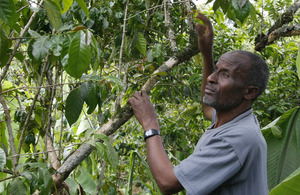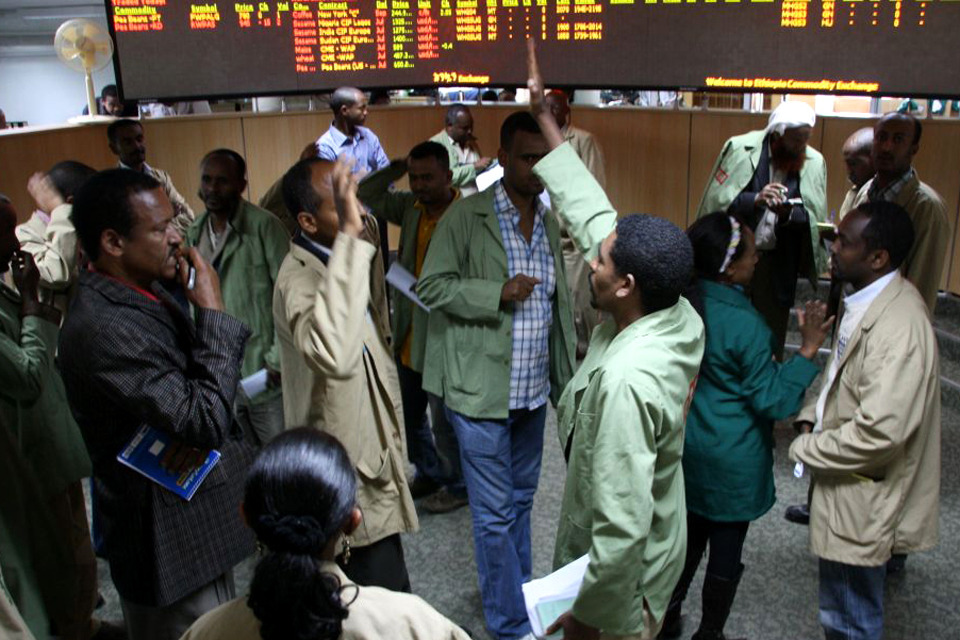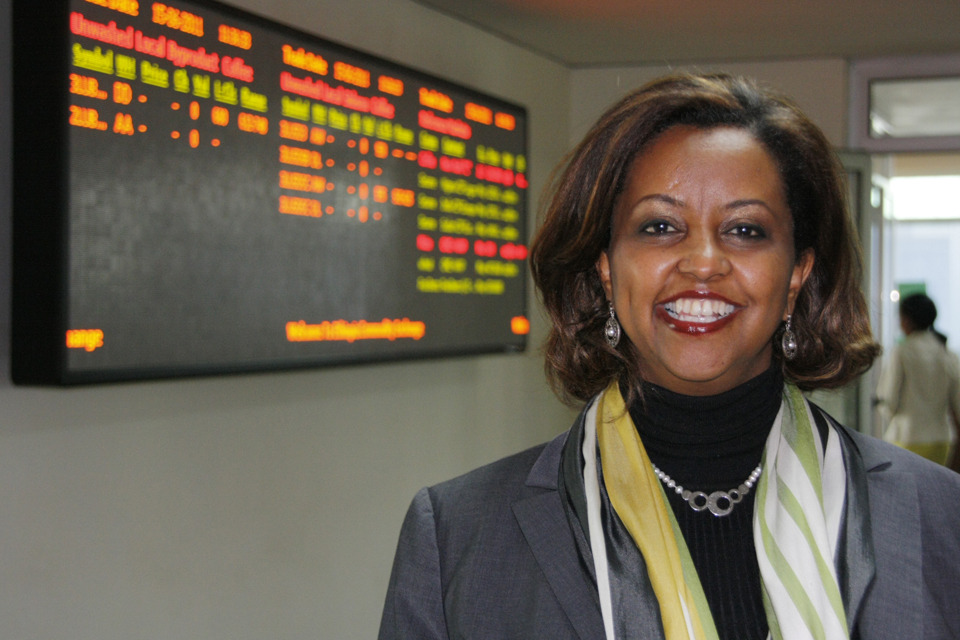Fair exchange
How UK aid is helping Ethiopian farmers to get a fair price for their produce

Where your morning coffee begins. Feleke Dukamo is a typical small-scale farmer in southern Ethiopia. Here he checks to see which of his coffee fruits are red, and ready to pick. to: Pete Lewis/DFID
A better life
Business is good for Feleke Dukamo, a coffee farmer in Awassa, southern Ethiopia. “My coffee sells for 9 times more than it used to”, he says, “and now I can aspire to a better life. I’ve been able to buy some cattle, and as my farm grows, I can employ people to help bring in the harvest.”
So life for Feleke and his family has been transformed, and he is providing jobs for people in his local community. How has all this been achieved? Through a simple piece of information - Feleke now knows the price of coffee.
Bean counting
Feleke gets his information from the Ethiopia Commodity Exchange (ECX), established 3 years ago with support from UK aid. A trading floor that deals in commodities such as sesame, coffee and peas, the ECX brings together buyers (often exporters) and sellers (farmers) from around the country.

High five seals the deal: Ethiopia Commodity Exchange trading floor. Picture: Pete Lewis/DFID
Most importantly for farmers like Feleke, the ECX also publishes the latest price that coffee is getting in Addis Ababa - this can go up and down according to seasons and the world market.
Valuable information
As well as publishing the information in newspapers, on radio and television, the ECX also has an sms service, and a new phone line which gives price information on recorded messages. The phone service, launched by the ECX earlier this year, is particularly popular and now gets 44,000 calls a day from farmers like Feleke - checking the latest price of their crop.
Before the Ethiopia Commodity Exchange was established, smallholder farmers like Feleke had no idea of the price that coffee was trading for in Addis - which left them prey to unscrupulous middle men, who would buy low, sell high, and claim a huge profit for themselves.
Knowledge is power
As Dr Eleni Gabre-Madhin, CEO of the Ethiopia Commodity Exchange explains, the ECX has given power back to Ethiopia’s farmers. “Because farmers are getting accurate and timely price information”, she says, “they now get a better deal. Before the ECX, the farmer’s share of the final coffee price was around one third. Now it is closer to two-thirds.”

Dr Eleni Gabre-Madhin, CEO of the Ethiopia Commodity Exchange. Picture: Pete Lewis/DFID
Dr Eleni is proud of the ECX’s record - in the 3 years since it was established, it has enabled more than £1 billion worth of trades, without a single default. By improving the system for trading coffee, it has helped to improve both the quantity and quality of Ethiopian coffee reaching the market. Ethiopia is the biggest coffee producer and exporter in Africa.
A country you can do business with
But Dr Eleni believes that the significance of the ECX doesn’t end with coffee, or even a better deal for the country’s farmers: “This is a big signal to the world: Ethiopia is a country you can do business with.”
We know economic growth is the most effective way of raising incomes and permanently lifting people out of poverty. Improving the conditions for stronger, long term economic growth in Ethiopia and across the countries we work in is helping to create jobs, markets and opportunities for people so they may no longer need to rely on international help in the future. We’ll also be helping more than 50 million individual people to access savings, credit and insurance, allowing families to cope better with a crisis and to make small investments which will increase their income.
Facts and stats
DFID supported 2 leading research institutes who were tasked with finding a solution to Ethiopia’s inefficient food and commodity markets.
The UK aid funded research recommended setting up a commodity exchange and helped to design the warehousing, logistics and payment systems that the exchange uses today. The exchange helps to boost exports and secure a better deal for farmers and consumers.
Before the Ethiopia Commodity Exchange existed, all coffee had to be transported to Addis Ababa for the single market there - a long and expensive journey. Now there are 16 warehouses around the country, so no farmer is more than 200 kilometres from a warehouse. The Awassa warehouse, in the south of Ethiopia, sees up to 200 trucks a day in peak coffee season.
In the 3 years since it was established, the Ethiopia Commodity Exchange has enabled more than £1 billion worth of trades, without a single default.
Ethiopia earned a record $841.6 million from the export of nearly 200,000 tonnes of coffee in 2010/2011 - up 59% from the previous year.
15 million Ethiopian smallholder farmers grow the crop, mostly in the forested highlands in the huge country’s west and southwest.